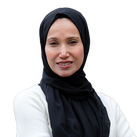This Eid, technology will ease loneliness and bring people together online. But not for all Muslims
The last 10 days of Ramadan are special ones for Muslims in which we seek salvation and forgiveness, but they are also filled with hope for a better world

Your support helps us to tell the story
From reproductive rights to climate change to Big Tech, The Independent is on the ground when the story is developing. Whether it's investigating the financials of Elon Musk's pro-Trump PAC or producing our latest documentary, 'The A Word', which shines a light on the American women fighting for reproductive rights, we know how important it is to parse out the facts from the messaging.
At such a critical moment in US history, we need reporters on the ground. Your donation allows us to keep sending journalists to speak to both sides of the story.
The Independent is trusted by Americans across the entire political spectrum. And unlike many other quality news outlets, we choose not to lock Americans out of our reporting and analysis with paywalls. We believe quality journalism should be available to everyone, paid for by those who can afford it.
Your support makes all the difference.This evening, 1.6 billion Muslims across the world will celebrate Eid al-Fitr. The festival marks the end of Ramadan – a holy month of fasting – and is traditionally observed with a feast, family gatherings, large prayer gatherings at the mosque, and a sense of goodwill.
But just as Ramadan has been extraordinary this year under the Covid-19 lockdown, Eid-al Fitr will also be celebrated under exceptional circumstances.
This year reminded me of my early years growing up in Britain when my family and I were the only family of colour on the street where we lived, and one of just three Muslim families in our neighbourhood. There was no mosque, and we travelled to London on the train to purchase our halal meat. My mum stitched our Eid clothes because there was no Muslim/Asian fashion industry at the time.
We celebrated Eid with a handful of people whom we knew. As a young person, it was lonely; there was no one of my age with whom to share Eid. Then there was the problem of our neighbours who did not know what Eid was, who stared at our clothes, and thought we were odd, especially after a month of hearing us get up just before dawn for a meal.
Patiently, we found ways to share our faith with them and we became friends.
This year, under Covid-19 restrictions, Eid will mean that families and communities will not be able to come together in each other’s homes or any other public places. They will pray and eat Eid food without being together, but they can be connected to each other’s lives through technology. When I was a child, the technology to connect people worldwide through a phone or iPad did not exist, so we are incredibly fortunate today to have these tools at our disposal.
In a modern world, Eid will be celebrated online and technology will ease loneliness and bring people together in a different way. But not for all Muslims.
Muslim garment workers in Bangladesh face no pay and the prospect of begging for food after western retail giants cancelled hundreds of millions of pounds worth of orders. Some companies, however, have taken a more ethical approach and have honoured all existing contracts, such as H&M and Zara.
Without access to technology, these workers will be completely alone. This brings to mind Imam Shaykh Ahmad Faruq Siddiqi, chaplain at the Royal London Hospital, who spent the last seven weeks facilitating last farewells via Zoom for dying loved ones and their families. He may well be experiencing another difficult day.
The last 10 days of Ramadan are special ones for Muslims in which we seek salvation and forgiveness, but they are also filled with hope for a better world. It was an incredible moment to hear on Thursday night the moving recitation of the Adhan, the call to prayer, arranged by Canary Wharf Group in the UK’s financial district. Under a Ramadan Covid-19 lockdown, this was an exceptional display of coming together and recognising the contributions of Muslims.
Sir Ed Davey, MP and acting leader of the Liberal Democrats, said: “2020 has seen loved ones forced to be physically apart even at the moment of death, people of different faiths made to rely on technology to allow celebration of different festivals and beliefs and those without a common faith rediscovering their neighbours and local communities.
“Ramadan, like faith observations, has brought people and communities together. Our shared spirit has provided us all with the resilience to persevere, come what may. I wish all Muslims celebrating Eid al-Fitr across the world a happy, blessed and safe day, Eid Mubarak.”
As Muslims, we are supposed to use the month of fasting as a time to reflect, understand and learn. April 2020 has seen those with different or even no faith reflect, understand and learn too. Ramadan and Eid under the Covid-19 lockdown will be one I and many Muslims and non-Muslims will remember for years to come.
If we have learned anything during this particularly unusual month of fasting and tragedy – and in celebration to mark the end of Ramadan – it should be to work towards a humbler, more tolerant and united world.
Rabina Khan is a Liberal Democrat councillor for Shadwell in Tower Hamlets Council

Join our commenting forum
Join thought-provoking conversations, follow other Independent readers and see their replies
Comments